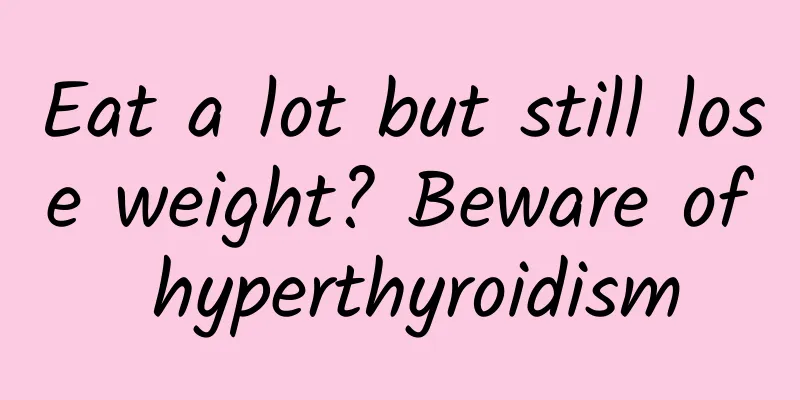Eat a lot but still lose weight? Beware of hyperthyroidism

|
Lili is 26 years old this year. She has fair and tender skin and a very sweet and lovely smile. Although everyone likes her, she is not satisfied with her appearance. She always thinks that it would be better if she could be thinner and have bigger eyes. For this reason, Lili tried many ways to lose weight, such as controlling her diet, increasing exercise, and even using various folk remedies. However, she was always unsuccessful in losing weight because of the temptation of delicious food and the hard work of exercise. But recently, Lili suddenly lost more than 10 pounds, her eyes became bigger, and her appetite was good. Lili was very happy, thinking that she had lost weight because of the recent work. But not long after, Lili began to have symptoms of palpitations, hand tremors, and insomnia, and had to go to the hospital for treatment. Graves' disease is the most common cause of hyperthyroidism After asking Lili about her medical history and symptoms in detail, the doctor conducted relevant examinations and found that her free triiodothyronine (FT3) and free thyroxine (FT4) were more than twice the normal level, her thyroid stimulating hormone (TSH) was reduced to almost undetectable, and her thyroid stimulating hormone receptor antibodies were elevated. Ultrasound showed diffuse thyroid enlargement. Lili was eventually diagnosed with toxic diffuse goiter (Graves' disease). Graves' disease is an autoimmune thyroid disease caused by the continuous increase of autoimmune antibodies - thyrotropin receptor antibodies, which can stimulate the thyroid follicular epithelial cells to continuously synthesize and secrete excessive thyroid hormones, thereby causing hyperthyroidism. Hyperthyroidism is a relatively common endocrine disease, the full name of which is "hyperthyroidism", caused by elevated thyroid hormone levels. Graves' disease is the most common cause of hyperthyroidism. The cause of Graves' disease may involve multiple factors, including genetic, environmental, mental, and immune factors. Like Lili in the above case, she lives by the sea, which is a high-iodine area; her aunt has a history of hyperthyroidism, so she has a family history; plus the recent hard work and mental stress, these are all susceptibility factors for her to hyperthyroidism. Clinical manifestations involve multiple systems of the body Graves' disease is more common in young women. Patients may experience symptoms such as pretibial myxedema and exophthalmos due to autoimmune abnormalities. Some patients also often have other autoimmune diseases, such as type 1 diabetes, systemic lupus erythematosus, and rheumatoid arthritis. Exophthalmos can be divided into simple (benign, non-infiltrative) exophthalmos and infiltrative (malignant) exophthalmos. Simple exophthalmos is related to the increased excitability of the sympathetic nerves caused by excessive secretion of thyroid hormones; while infiltrative exophthalmos is more pronounced and is related to the autoimmune inflammatory response of the periorbital tissues, often accompanied by eyelid swelling and hypertrophy, conjunctival congestion and edema, diplopia, strabismus, narrowing of the visual field, decreased vision, and in severe cases, fixed eyeballs, unequal degrees of exophthalmos on the left and right, incomplete eyelid closure, corneal ulcers or panophthalmitis, and even blindness. At the same time, due to excessive secretion of thyroid hormones, patients may experience thyroid enlargement and a series of hypermetabolic symptoms. These hypermetabolic symptoms include impaired glucose tolerance, decreased blood lipids, negative nitrogen balance and weight loss. In severe cases, cachexia may occur. At the same time, due to increased heat production and heat dissipation, patients may become afraid of heat and sweat a lot. As thyroid hormones increase in the blood circulation, it can also cause abnormal functions of multiple systems such as the nervous system, cardiovascular system, digestive system, skeletal muscle system, hematopoietic system, and reproductive system, resulting in a series of symptoms. For example, the impact on the nervous system can cause patients to become irritable, insomnia, and have tremors in their hands and tongues. The impact on the cardiovascular system can cause palpitations, arrhythmias, increased blood pressure, and increased pulse pressure. The digestive system can cause polyphagia, hunger, abnormal liver function, and increased bowel movements. The skeletal muscle system can cause osteoporosis, muscle weakness, atrophy, and hypokalemic periodic paralysis. The hematopoietic system can cause a decrease in the total number of white blood cells and an increase in lymphocytes and monocytes. The impact on the reproductive system can cause women to have reduced menstruation or amenorrhea, and men to have impotence and breast development. Severe hyperthyroidism can also lead to hyperthyroid heart disease, hyperthyroid crisis, etc., which are life-threatening. Lili's recent symptoms of weight loss, increased appetite, palpitations, hand tremors and insomnia are all typical manifestations of excessive secretion of thyroid hormones; and her so-called enlarged eyes are a manifestation of exophthalmos caused by thyroid eye disease. The three treatment methods each have their own advantages and disadvantages At present, there are three main methods for treating hyperthyroidism: antithyroid drug treatment, radioactive iodine 131 treatment and surgical treatment. These three treatment methods each have their own advantages and disadvantages. The specific method to be used needs to be judged by the doctor based on the patient's specific situation. Antithyroid drug treatment is suitable for patients with mild to moderate thyroid enlargement, young people, pregnant women or the elderly and infirm, those preparing for surgery, those with postoperative recurrence or those who are not suitable for radioactive iodine 131 treatment, but it may cause granulocytopenia, liver damage, cholestasis, and lupus-like syndrome; radioactive iodine 131 treatment is suitable for some older people, those who are allergic to antithyroid drugs, those who are ineffective or have recurrence after treatment, those who are not suitable for surgery or have recurrence after surgery, those with certain high-functioning nodules, or those with non-autoimmune familial toxic goiter. The disadvantage is that it may cause worsening of exophthalmos, thyroid crisis, radiation thyroiditis, and permanent hypothyroidism. Currently, surgical treatment of hyperthyroidism is rarely used and is mainly suitable for patients who are ineffective with antithyroid drugs, those with enlarged thyroid glands with compression symptoms, those with retrosternal goiter and hyperthyroidism, and those with nodular goiter and hyperthyroidism. The disadvantage is that there are risks of wound bleeding, respiratory obstruction, infection, hyperthyroid crisis, superior laryngeal and recurrent laryngeal nerve damage, hypoparathyroidism, hypothyroidism, and worsening of exophthalmos. In view of Lili's own situation, the doctor recommended that she take medication immediately. But Lili was worried that taking medication would affect her future fertility and was a little hesitant. The doctor told Lili that there was no need to worry about it, and that the duration of medication treatment was generally 1 to 3 years. Even during the medication period, it was possible to get pregnant. However, if not actively treated, the aggravation of hyperthyroidism may lead to reduced menstruation or amenorrhea, which may affect fertility in severe cases. The doctor told Lili that she should take a rest, relax, avoid high-iodine foods, stop smoking, go to the doctor's office on time, and take medicine as prescribed by the doctor. "As long as you follow these instructions, this disease can be cured. Don't worry!" After listening to the doctor's explanation, Lili finally felt relieved. Through Lili's case, we need to pay attention to the fact that if someone in life suddenly eats a lot and loses weight, accompanied by palpitations, hand tremors, insomnia and other symptoms, we should be alert to the possibility of hyperthyroidism. Once diagnosed with hyperthyroidism, the patient must follow the doctor's advice for treatment. (The author is an associate chief physician and associate professor in the Department of Endocrinology at Beijing Chaoyang Hospital, Capital Medical University) |
>>: Protect children's spinal cord health and dance to a healthy body
Recommend
My belly is swollen during my period
Menstruation, also known as menstruation, is a re...
When traveling on vacation, please keep this list of essential medicines!
Entering the Mid-Autumn Festival and National Day...
The health warning behind delicious food: How to eat healthier, a balanced diet is the key!
In such a warm and harmonious family, Mr. Yang, M...
There is a lot of leucorrhea when defecating
In daily life, many women are particularly concer...
National Myopia Prevention and Control Education Month | How to prevent and control myopia in children? Beware of four blind spots!
For the sake of children's studies Many paren...
What is the purpose and significance of reading? Why should women read?
Through reading, you can not only learn how to so...
Will it hurt? How long will it take?
If you don't want to have children, you have ...
How did the Japanese epidemic occur? Was the Japanese novel coronavirus transmitted from China?
After the outbreak of the new coronavirus epidemi...
What disease is there in women's urethral discharge?
Most women who sit in the office for a long time ...
Don't put these 5 types of food in the refrigerator, they will go bad faster
The refrigerator carries people's expectation...
What should girls do if their breasts are not well developed?
After entering puberty, women begin to develop th...
Pictures of cervical erosion discharge
Cervical erosion is a gynecological disease that ...
What to do if your face is itchy during pregnancy
The body undergoes significant changes after preg...









